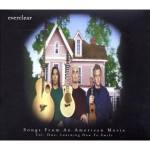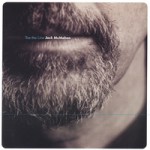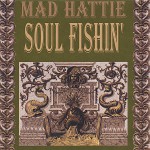 Everclear
Everclear
Songs From An American Movie…
Capitol Records
Everclear’s third Capitol release reflects a sense of maturity on the part of leader Art Alexakis, as well as an independent attitude that he and the band have earned, through what must be considered veteran status in this era of one-hit obscurity. As always, the lyrics dwell on interpersonal relations: in all directions, from all viewpoints. But perhaps even moreso than usual, Alexakis seems particularly cogitive, with a wistful insinuation of yearning nostalgia.
The leadoff title track echoes “Santa Monica” melodically, though far mellower. And instead of a nihilistic rant about watching the world die, we have a gentle ode to a father watching his daughter at play. Art’s jangling 12-string acoustic and bassist Craig Montoya’s repetitive mandolin arpeggio carry the song.
‘Here We Go Again” a celebration of a hot love affair, coasts on Greg Ecklund’s snappy, syncopated beat and an additional horn section swelling in the turns, with chunky electric guitars providing further motivation.
A Hip Hop beat and a canned sample of Jean Knight’s “Mr. Big Stuff” propels “AM Radio” a sentimental look at the days when radio, and music in general, were less commercial and more open to a variety of influences. A surprisingly overblown and flaccid take on Van Morrison’s chestnut “Brown Eyed Girl” follows, as if to illustrate the point.
Symphonic synth strings color “Learning How To Smile,” a low-rent ditty about a couple that tries to survive the favorable odds that life will swallow them. Ecklund’s ukelele dresses up the 3/4 lowkey hoedown of “The Honeymoon Song,” wherein (possibly) the couple in the previous song finds salvation at the end of the rainbow in Hawaii.
Ecklund’s John Bonham-like drums drive the synth string maelstrom of “Now That It’s Over.” Obvious references to mid-period Zeppelin do little to disguise the fact that the song is another Alexakis creation. Jimmy Page comes to mind on the 12-string twirls of “Thrift Store Chair,” though references to John Prine within and without the song are apt: a country twang befitting the short tune.
“Otis Redding” harkens to earlier days, as many of the songs do, when life was apparently less complicated, despite poverty and drug dependency. A nice turn in the choruses, replete with stirring string charts, keeps the song from being too predictable, a crime that Alexakis’ melodic sensibilities could easily commit.
Witness the construction of “Unemployed Boyfriend.” Alexakis’ lyric lines scan almost identically from song to song, all sounding more or less like rewrites of “I Will Buy You A New Life.” But the words mean something, all the same: “ You can be with me, yes I will treat you like a queen/I will go to all those chick flick movies, that I don’t really want to see/You can be with me, I will never let you down/ I will never make out with your girlfriends , when I know you’re not around.”
“Wonderful” is probably one of the better examples of the “new” Everclear sound. R&B flavored orchestral keyboard touches make for thicker, more ponderous arrangements. Mort Lindsey, Merv Griffen’s longtime musical director, conducts the strings on Alexakis’ Beatlesque (think of “Goodnight” from the Double White album) “Annabella’s Song,” another tune about being a father. Whereas, in the past, Art was chiding his own parent for mistakes made (such as in “Father Of Mine”), Alexakis seems to be trying to convince his daughter that he is not making the same errors. An interesting sociological study could be made of this.
It is difficult to know what to make of this album. Alexakis is definitely trying to extend the inherent limitations of his idiom. But most of it is window-dressing. The strings and horns and laidback arrangements only serve to reinforce the notion that Art does not have a lot of melodic variety at his command in his songwriting. In a more Rock oriented format, this is not, perhaps, so noticeable. Here it is especially obvious.
It’s hard to believe that Capitol will let the band release too much more of this sort of stuff. While there are a few radio friendly, tried-and-true Everclear songs here (“Here We Go Again,” “AM Radio”) a lot of the material is too soft and fluffy to muster much energy. By bogging the arrangements down with superfluous instrumentation, Alexakis’ limitations as a melody writer are only brought into clearer perspective. It’s probably safe to assume that was not his intention.
 The Dandy Warhols
The Dandy Warhols
Thirteen Tales From Urban Bohemia
Capitol Records
It’s hard to believe that it’s already been five years since the Dandy Warhols released Dandys Rule, Okay on Tim/Kerr records. And three since their first Capitol release, The Dandy Warhols Come Down. Leisurely would be the best word to describe their career pace. In that time they have the opportunity to become endarlinged of and by the European music scene— who, after all probably get the joke. It’s a joke you know.
Oh, not the band mind you. The band is great. The joke is the name, but it’s more than that. It’s the attitude that comes with the territory of the name, Dandy Warhols. It was Andy Warhol who started the joke (and not a whole lot of Americans ever got it). And it’s the Dandys who carry the banner forward. The band understands the joke and continues to play it. To the hilt.
Leader Courtney Taylor-Taylor, as he chooses to call himself these days, has a gift for creating understated Pop masterpieces that linger in the mind like a glass of fine wine or a bong hit of some really great weed. Guitarist Peter Holmström continues to grow as a musician. Likewise, for keyboardist-bassist Zia McCabe, who could barely play when she started, for heaven sakes. Whether by destiny or design, the band sounds more British than American. Maybe that’s why they’re so beloved in the Euro theater.
Longtime drummer Eric Hedford left the band awhile back, is replaced here by Brent DeBoer, who does a find job of guiding the beat through Taylor-Taylor’s often meandering songwriting style. Mention too should be made of the tremendous contribution of stellar slide guitar accents on several songs by one Troy Stewart.
The Dandys are nothing if not a tribute band to their influences, which include but are not limited to the Velvet Underground and Lou Reed, David Bowie, the Pixies and Frank Black, the Cult, the Beach Boys, the Byrds, Iggy Pop, Pink Floyd and Oasis, among many others. They pay tribute. They are not a cover band.
At the outset it would seem that Taylor-Taylor was here able to closer realize the more spacious aspects of his music that he had to abandon during the recording of what eventually became Come Down. But there is nothing blasé or esoteric about the music. Each song has an instantly memorable, undeniably sharp hook.
It’s just that the hooks are not always buried in the vocal choruses as Pop decorum would dictate. Instead they are just as likely to appear as an instrumental figure as with (Portland’s own) Eric Matthews’ pretty trumpet figure on “Godless” or Stewart’s affective slide work on “Mohammed” and downhome barnyard cornpone on “Country Leaver.”
Which is not to say that the big-beat snotty Dandys have disappeared. They come out hard on “Nietzsche,” a tune bearing a chord progression that could pass for a rewrite of the Troggs’ classic “Wild Thing.”
And “Solid” finds Courtney dabbling from his Lou Reed bag, his voice low, nasal and sinewy. Over crunchy rhythm guitar and telegraphic synth chits, Courtney lodges a few personal observations: “Well I must have a door in the back of my head/Where I dump out all that crap so I can just feel solid again/No more sittin’ around thinkin’ about your hair/Coz I must have a door in the back of my head.”
“Horse Pills” rocks even harder with Courtney’s curled-lip vocal rap— so witheringly hip and off-handedly cool. Cutting to the chase, “Get Off” is a confectious piece of ear candy, sprinting upon a rhythmic acoustic guitar and a pubby, singalong vocal quality. It’s a hit! “Cool Scene” whines and whirs with several brilliant tiny machinations.
Jamming off of the Stones’ “Gimme Shelter,” “Bohemian Like You” is steamrolled by DeBoer’s muscular drum beat and Courtney’s ingenuously catchy lyric. “You’ve got a great car, yeah what’s wrong with it today?/I used to have one too, maybe I’ll come and have a look/I really love your hairdo yeah/I’m glad you like mine too, see we’re lookin’ pretty cool.” Dipping into the Reed bag yet again, “Shakin’” massages the mind’s carotid toward glorious unconsciousness.
There’s hardly a misstep among the thirteen songs presented here. Holmström’s “The Gospel,” though not a bad song, suffers in comparison to Taylor-Taylor’s clever manifestos. The first two songs are slow to develop, thew last two never do. But all are identifiable as the work of the Dandys, and are good songs in and of themselves.
This is an album from a band in complete control of its studio powers. Taylor-Taylor and co-producer Greg Williams carry out a distinct game plan with this recording, segueing from track to track. As with all of the Dandy’s other productions this one is a joyous and humorous outing. which captures the human experience in a unique way, combining real sentiment and profound cynicism into unusual admixtures.
Critics, of course, will malign the band for sounding too much like their influences, as if it were the first time that ever happened in Pop music. Others will scratch their heads, unable to fathom the genius that lies behind this production. It’s a joke. It’s all a big joke. Why take it so seriously? What a wonderful album!
 Gary Ogan
Gary Ogan
Barcelona
Self-Produced
In a right and just world, Gary Ogan would have been a big star years ago. Decades ago. Beginning with his stint with Bill Lamb in the early ‘70s, as Portland (with their regional hit “Portland Rain”), and including time on the road with fellow Oklahoma native Leon Russell, Ogan has amassed a résumé that should be the envy of most other local musicians. As a multi-instrumental musician and songwriter, Ogan has few peers in the region. Still, he has yet to receive his due.
Part of this is attributable to his decidedly low-key personality. Part to his tendency to wander: from here to Nashville and back again. Part of the reason lay in bad timing and bad luck. But, all the same, Gary Ogan deserves a place in whatever local pantheon is at last erected to our local musical heroes— should that day ever arise.
Though the eleven songs (and one reprised number) presented lack the big hit that one might expect, or hope for, from Ogan, they still exemplify his workman-like approach to his music. Here he plays all the instruments, layers all the vocals, while serving as his own engineer and producer. The album stands as a testament to his skills within all those crafts.
“Cool Is Still Cool” is the lead track, as well as the aforementioned reprise at the end. It’s a bouncy tune, with a hint of buoyantly stylish Steely Dan-ish Jazz phrasings in the keyboard presentations, which include an array of piano sounds, as well as vibe tones and an analog synth patch. Ogan’s confident vocals are supported by a snappy drum beat. A good song.
Closer to Ogan’s folky roots, “Til The Next Time I See You” could pass for the work of his buddy Craig Carothers (who did the graphics for this project). Swatches of mandolin fills bubble up over insistent hand drum backing and multiple harmony vocals. Nice.
“Which Way” combines gentle acoustic and electric guitars with Rhodes-like keyboard flourishes to produce a sound not unlike that of Eric Clapton in his recent “unplugged” forays. Smooth. Likewise, “Friends Until The End” creates a comparable atmosphere.
Capturing a similar feel, while echoing the Beach Boys’ “Don’t Worry Baby” at the same time; and bearing a faint structural resemblance to Fred Neil’s “Everybody’s Talkin’,” “Come To Me” is a pleasant ballad with an uptempo feel over a modest accompaniment of drums and guitar.
An R&B flavor permeates “Shame Shame,” an uptempo rocker that still manages to maintain a laid-back feel. “Foolsrush Inn” continues in the rock milieu. But Gary isn’t likely to frighten anyone with his energy level. Everything is totally under control.
“Long Way From Runnin’ Out” shares a thoughtful mood with Paul Simon’s “Still Crazy After All These Years,” although Ogan’s presentation is confined to just a solitary guitar and vocal. “I Love You A Lot,” combines a catchy rhythm with a highly stylized vocal technique to achieve a swampy confection, comprised of slide guitar and Rhodes keyboard. The pretty ballad “You Are My One” sounds vaguely like an Irish air, Ogan’s soft tenor murmuring above a sparse arrangement
At this stage in his career, Gary Ogan would not be likely to change stylistic courses. One does not anticipate an Hip Hop manifesto springing from him at this later date. But he is certainly surehanded at what he does, while ultimately remaining true to his muse. This journeyman effort speaks to and maintains a high level of artisanship in the school of Pop music.
 Jack McMahon
Jack McMahon
Toe The Line
Jaron Recording
Here’s another songsmith who’s been working in and out of Portland for over twenty years. Like many others, he made the Nashville migration, only to return to P-town when it became apparent that the new Country music wasn’t the goldmine in the hills that it first appeared to be.
But McMahon’s career goes back even further, to his younger days as a Folky in Greenwich Village opening for the likes of Steely Dan and other big name acts. After that he performed demos for Gerry Goffin— after his former songwriting partner, Carol King, had gone on to solo success.
Here McMahon is joined by another veteran, former Distraction Ron Stephens who plays a variety of lead guitars while producing the album; and by Gary Ogan who played drums, adding keyboards and accordion to some tracks as well. Jeff Woodcock played bass on most tracks, though Rich Gooch and Jason Heald jumped in on occasion.
McMahon’s music, though rooted in acoustic Folk music, has a distinctive Country feel as well, moreso than his compatriots who made the Nashville move in the ‘90s. Jack’s vocal delivery is as affable as Jimmy Buffett, as introspective and sincere as Willie Nelson. His songwriting is as reliable as an old Plymouth Valiant. Nothing spectacular or flashy, but of a consistently high caliber.
Most of the songs are ballads or mid-tempo numbers, although “Whatever” and “Hi-Yo Silver” rock out a bit. Stephens’ classy work on pedal steel guitar is showcased on the latter, as with a few other tunes.
Perhaps the best song of the eleven presented here is “The Hero.” Over a laid-back, Country inflected feel, McMahon sings a song reminiscent of Buffett’s “Living And Dying in 3/4 Time.” A well-hewn lyric brings the song home. “Go through your stages/Let time turn your pages/As innocence fades away/You’re reaching for things that are far beyond your grasp/Just keep on trying/ Just keep that light shining/ And let your heart lead the way/Most anything at all that you want why you just have to ask.”
“California Driver” tells the story of how McMahon ended up in Portland (by way of LA), “Where I’m on my own, 3000 miles from home. “When The Rain Came Down,” a song covered by Cowboy Angels in 1996, is given McMahon’s own, more personal stamp. The title track, while rich in philosophy is errant in its estimate of astronomy. “I know the difference between us/Seems like the night and the day/Sometimes we’re like Mars and Venus/So many light years away.” Mars and Venus are quite a distance apart, but hardly light years.
Jack McMahon is not the type of guy to hit you over the head with his talent. His is a more subtle ability. But his songs are skillfully constructed and faithfully rendered— maybe not particularly sexy, but true to themselves all the same. Anyone who is a fan of fine songwriting craftsmanship will like what he does.
 Mad Hattie
Mad Hattie
Soul Fishin’
Self Produced
Here’s a band that breathes new life into the Bluegrass idiom, while remaining ever-conscious and respectful of the inherent traditions within the genre. Still, if a musical form can be reborn, Mad Hattie prove themselves to be pregnant with new Bluegrass ideas.
The ringleader is a multi-talented young woman named Dee Settlemier, who plays solid mandolin and acoustic guitar, and some very mean-assed banjo— as well as singing the daylights of the baker’s dozen of songs presented here.
She is joined by a roster of fine musicians, including fiddler Marilee Hord; guitarist Brett Malmquist who played bass for Jesus Presley for five years; trumpeter/pedal steelguitarist Paul Brainard, who also is a graduate of the Presleys; as well as drummer Jim Bott, bassist Matt Voth and harmonica cat David Lipkind.
But the show clearly belongs to Ms. Settlemier. Except for the brief free-Jazz foray entitled “Absynthe,” which was composed by Brainard, she wrote all the material. And it is clever stuff, obviously reverently true to the source, but faithful to her own muse as well.
Check out the mighty diamond that is the title track. Settlemier’s dancing banjo jigs around Hord’s howl fiddle and Lipkind’s moaning harp. Over this Dee utters the chilling lyric: “I got me a job fishin’… fishin’ for my soul.”
“Hey Jingo” combines Botts’ bellydancing beat with the familiar droning plaint of the banjo. Settlemier’s husky contralto sails over the top. Nice. “Oh Red” follows a similar pattern, drawing even more from an Easten motif, adding a small orchestra of violins, including Hord, whose gypsy tinged solo is buttressed by the dripping lines of the “rhythm fiddles. ”Very Cool.” Settlemier provides superb harmony to her dusky lead vocals. An exotic chanty of the highest order.
The band rocks out a tad on White Devil Blues” and “Here Comes Goliath,” with satisfatory results. And the Miles Davis-tinged Be Bop intro to “Suburban Living,” neatly disguises a peppy foxtrot, wherein Brainard gets to show off his chops on trumpet, dobro and pedal steel guitar. Dee is up to the challenge, with some high-throttle vocal action of her own. “Deep Blue Sky” is closer to pure Country, at first. Then it kinda turns dangerous, becoming a runaway train. Dee’s fine, harmonied vocals riding over the top with Stevie Nicks-like ease.
Mad Hattie and leader Dee Settlemier show a lot of versatility, with some superlative musicianship; and canny arrangements that utilize the players to the best of their abilities, without going overboard. This is a very nice first effort by a group of talented musicians from whom we are sure to hear much more.
